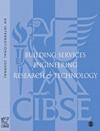英国利用城市废水热回收脱碳的机会
IF 1.8
4区 工程技术
Q3 CONSTRUCTION & BUILDING TECHNOLOGY
Building Services Engineering Research & Technology
Pub Date : 2021-07-29
DOI:10.1177/01436244211034739
引用次数: 6
摘要
到2050年,英国政府计划创建“净零社会”。1为了实现这一雄心勃勃的目标,部署低碳技术是当务之急。通过热泵从污水中回收热量等低碳热回收技术可以发挥重要作用。它基于从消费者添加的污水中回收热量,这些污水在下水道中使用和冲洗。这项技术目前已在世界各地的许多城市成功运行。在英国,在苏格兰加拉希尔的Borders学院成功实施污水热回收示范项目后,人们对探索这项技术的兴趣也越来越大。2然而,还需要进一步的实验研究来建立证据基础,在英国其他地方复制和降低这一概念的风险。伦敦南岸大学的家庭能源4明天(HE4T)项目就是为了解决这一证据差距而创建的。这是关于污水热回收的系列文章中的第四篇,并使用英国首都伦敦的污水数据介绍了一些结果。这些数据很少,提供了有关英国首都下水道流量和温度变化的有用信息。最后,我们讨论了可回收热量潜力以及对英国供暖战略的政策影响。实际应用这项工作的重点和重点是,为了实现气候变化目标,可以通过从英国尚未开发的未经处理的废水(进水)和处理过的废水(污水处理厂的出水)中回收热量来实现实质性的改进。所提供的估计表明,英国有很大的理论潜力,在实现“净零”目标的长期内,未来的能源和收入回收以及温室气体减排都有很大的机会。这项工作旨在提高人们的认识并寻求支持,以促进试点研究,帮助证明建筑行业的技术和经济可行性。本文章由计算机程序翻译,如有差异,请以英文原文为准。
Opportunities to decarbonize heat in the UK using Urban Wastewater Heat Recovery
By 2050, the UK government plans to create ‘Net zero society’. 1 To meet this ambitious target, the deployment of low carbon technologies is an urgent priority. The low carbon heat recovery technologies such as heat recovery from sewage via heat pump can play an important role. It is based on recovering heat from the sewage that is added by the consumer, used and flushed in the sewer. This technology is currently successfully operating in many cities around the world. In the UK, there is also a rising interest to explore this technology after successful sewage heat recovery demonstration project at Borders College, Galashiels, Scotland. 2 However, further experimental research is needed to build the evidence base, replicate, and de-risk the concept elsewhere in the UK. The Home Energy 4 Tomorrow (HE4T) project at London South Bank University was created to address this evidence gap. This is the fourth article in the series of outputs on sewage heat recovery and presents some results using sewage data from the UK’s capital London. These data are scarce and provide useful information on the variation of flows and temperatures encountered in the sewers of the UK’s capital. Lastly, we discuss the recoverable heat potential along with policy implications for the UK heat strategy. Practical application This work focuses and accentuate that in order to meet climate change targets, substantial improvements can come by heat recovery from the raw (influent) and treated wastewater (effluent from wastewater treatment plant) that is still unexploited in the UK. The estimation presented indicates that there is much theoretical potential in the UK with significant opportunity for future energy and revenue retrieval along with GHGs emission reduction in the longer term to fulfil the ‘net zero’ objective. This work aims to raise awareness and seek support to promote pilot scale studies to help demonstrate technical and economic feasibility in the building industry.
求助全文
通过发布文献求助,成功后即可免费获取论文全文。
去求助
来源期刊

Building Services Engineering Research & Technology
工程技术-结构与建筑技术
CiteScore
4.30
自引率
5.90%
发文量
38
审稿时长
>12 weeks
期刊介绍:
Building Services Engineering Research & Technology is one of the foremost, international peer reviewed journals that publishes the highest quality original research relevant to today’s Built Environment. Published in conjunction with CIBSE, this impressive journal reports on the latest research providing you with an invaluable guide to recent developments in the field.
 求助内容:
求助内容: 应助结果提醒方式:
应助结果提醒方式:


